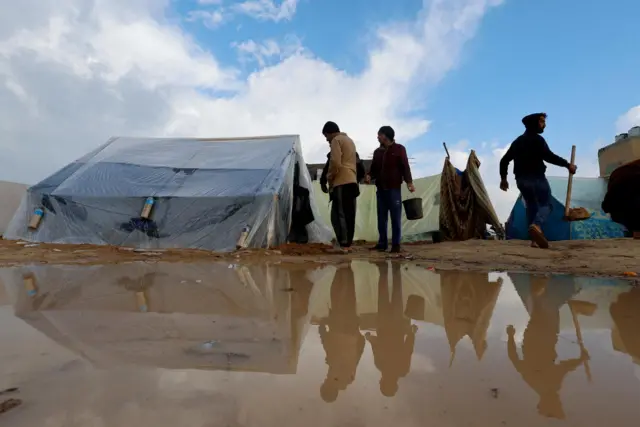Rains Threaten Health Crisis in Gaza Amid Intensifying Regional Conflict
The Gaza Strip faces a looming health catastrophe as the rainy season exacerbates dire living conditions, according to the UN’s Palestinian refugee agency. With over half a million displaced residents at risk of sewage floods, the situation threatens to spiral into a full-scale public health emergency. Freezing temperatures further compound the crisis, posing severe risks to thousands of malnourished individuals, particularly children and the elderly.
Escalating Hostilities Across the Region
Meanwhile, regional tensions continue to escalate. Hezbollah, operating out of Lebanon, has reportedly launched 340 missiles and drones into Israel. Israeli Army Radio confirmed that the strikes caused “severe damage” in Tel Aviv, injuring at least 11 people. Israel has retaliated with intensified bombing campaigns targeting Beirut, deepening the crisis in Lebanon.
Medical Infrastructure Under Siege
In Gaza, Israeli forces have launched fresh attacks on critical infrastructure, including the Kamal Adwan Hospital in the north. This follows an earlier assault that claimed two lives and injured over a dozen medical staff, including the hospital’s director. The repeated targeting of healthcare facilities severely hampers efforts to treat the thousands of injured amid the ongoing conflict.
Devastating Human Toll
The humanitarian crisis in Gaza has reached unprecedented levels. Since October 7, 2023, at least 44,235 Palestinians have been killed, with over 104,638 wounded in Israeli military operations. In Israel, the Hamas-led attacks on October 7 resulted in 1,139 fatalities, with more than 200 individuals still held captive.
The conflict has also inflicted significant casualties in Lebanon, where Israeli airstrikes have killed at least 3,754 people and injured over 15,600 since the war’s escalation.
Urgent Calls for Action
The compounded impact of war, displacement, and environmental challenges underscores the urgent need for international intervention. Relief organizations continue to call for immediate ceasefires to facilitate the delivery of humanitarian aid and medical supplies to affected areas. Without swift action, the region faces the prospect of worsening humanitarian and health crises as winter sets in.
This tragic convergence of conflict and environmental hardship highlights the critical need for a sustainable resolution to ensure the safety and dignity of millions caught in the crossfire.
Source : Swifteradio.com


